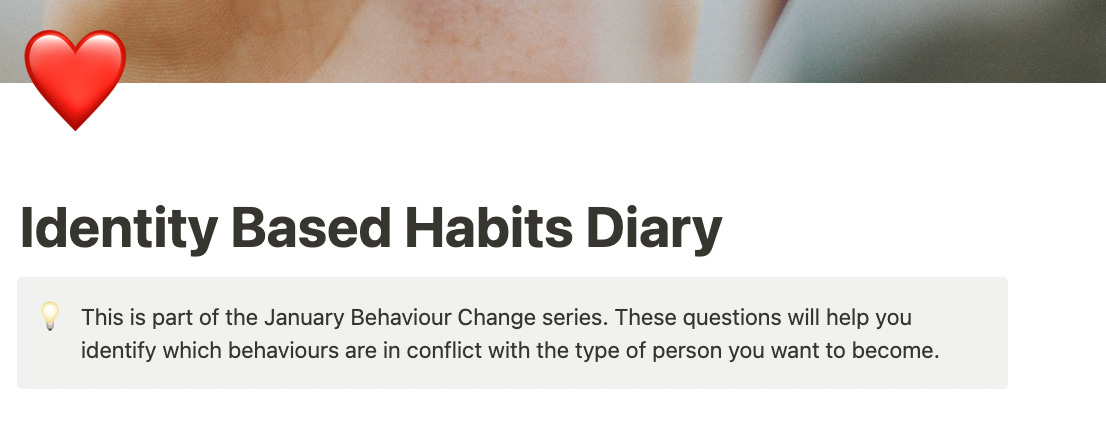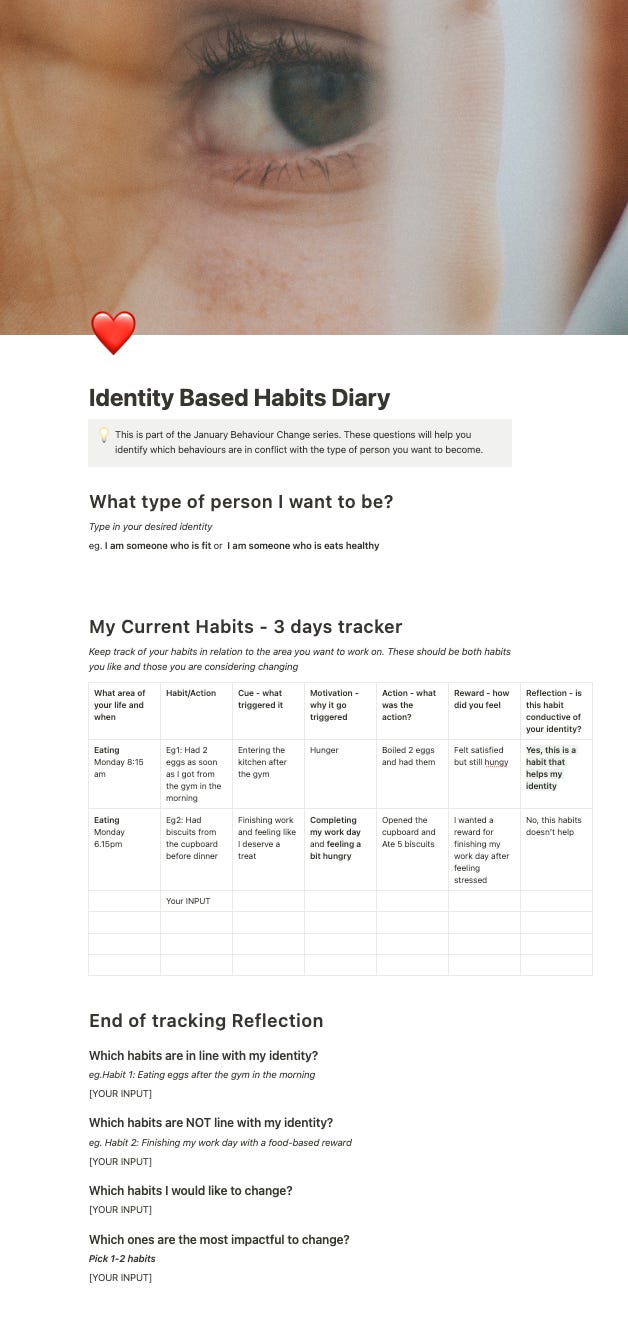PCOS and Dieting #52
Changing the narrative in 2024!
Hello all,
I hope you have survived the first week of 2024. This week is always filled with planning expectations, getting back into work and kicking off another year. If you have been looking for some help with implementing change in 2024, this newsletter is for you ❤️.
👋🏼 Sneak Peak: this newsletter contains an exercise
With a new year, there are also resolutions and goals that we usually set. Health will most likely be on our list since we have this wonderful condition: PCOS (sarcastic). We also know that diet and weight play a significant role in the management of PCOS. So, I assume many of us will have goals around losing weight, eating better and moving more.
With that in mind, I need to address a trigger warning.
⚠️ Please don’t go on restrictive diets ⚠️
They don’t work. Please don’t cut all sugar out or whatever the new trend is. I have worked for 2.5 years in the weight-loss industry and another 1.5 years in the type 2 diabetes management space. I have spoken to hundreds of women who have gone through these vicious dieting cycles results in losing confidence in themselves, feeling like a failure, and always putting the weight back.
For the majority, these were women without PCOS. Imagine now trying to diet with the increased load of hormonal changes and symptoms PCOS give us.
Well, so how do I eat better, lose weight and exercise more? I hear you say.
From my experience working in this industry for 4 years, the only thing that can help you lead a healthier life is behaviour/habit change. Those who eat healthily and are fit engage in behaviours that positively impact their lifestyle.
For this reason, I will dedicate the January Newsletters to behaviour change and discuss:
What are behaviours? [Today]
Why are changing behaviours so hard? [Today]
Setting goals [Today]
Identifying habits that serve us and those who don’t [Today] with exercise
Setting new Habits [Next Sunday]
Habits pitfalls [Following Sunday]
Emotional and Stress Eating
All-or-nothing thinking
Toolbox of techniques to help you stick to your habits [Last Sunday of Jan]
For this series, I will focus mainly on eating and exercise as the umbrellas of behaviours. However, this can be applied to all other areas (social media usage, smoking, alcohol etc).
Let’s get into it. This newsletter is a tiny bit long, but it’s worth it. I promise.
What are behaviours?
Behaviours are actions. They represent the way we react to a stimulus in our environment. Whenever we face life, our brain scans our environment and decides how to respond. This starts happening when we are born. Gradually, these responses build-up, developing neural pathways and becoming automatic responses. Behaviours turn into habits.
Think about your commute to work. For the first time you did it, you had to use Google Maps. After two weeks, you get to work without even realising how you did it. It has become a habit; it’s automatic. This is a transition from conscious thinking (checking the map) —> to unconscious thinking (getting to work without realising it). We have a lot of these habits embedded in our life.
When behaviours become automatic, it gives us an advantage because the brain does not have to use conscious thought to perform the activity.
It's the same story regarding changing our eating or exercise habits. Our morning ritual of having coffee it’s a habit. Our usual midday sandwich we pick up, it’s a habit. Our biscuit craze after a stressful workday, it’s a habit. They are habits that are buried deep down into our unconsciousness. We need to surface them and learn what they are.
Why changing behaviours is hard?
There are a few reasons why changing behaviours that have turned into habits is hard:
They have a strong route - as mentioned, these patterns of behaviour create neural pathways in our brains. As we repeat a habit, these neural pathways become stronger and stronger (like a footpath on a hiking trail). Changing these pathways requires the brain to come out of unconscious thinking and dedicate precious resources to create another pathway.
The human brain evolved to prioritise immediate rewards over delayed rewards or an unfavourable experience - when we do an action, our brain computes the reward that came with it. Enjoyable behaviours prompt your brain to release dopamine, which makes us feel good.
Our environment is optimised for rewards - given our brain loves positive rewards, most people will spend all day chasing quick hits of satisfaction. And for that, we have designed a world full of opportunities to get a quick hit of dopamine: the biscuits, the social media, the alcohol etc.
Motivation and Willpower are feelings - and feelings are not constant or reliable. Sometimes we feel like working out, and sometimes we don’t.
Diets usually try to instil new behaviours in your life. The issue with them is that they are trying to change too much at the same time while ignoring your current lifestyle (creating a massive effort for your brain to create new pathways). In addition, it deprives your existing reward system (lowering your dopamine levels). In addition, it often relies on willpower and motivation, which fade away quickly. Top this up with our environment full of reward-based experiences, and we are in deep trouble.
How do we change behaviours?
Identity-based goals
In order to learn how to change these behaviours, let’s first take a swift detour on why we want to change them in the first place.
I want to rely on an extract from Atomic Habits. This is a book I highly recommend reading.
There are three levels at which change can occur:
The first layer is changing your outcomes – concerned with changing your results: lose 5kg, publish a book, release a programme
The second layer is changing your process – concerned with changing habits and systems – implementing a new routine at the gym and developing a meditation practice.
The third and deepest layer is changing your identity – this is concerned with changing your beliefs, self-image, and judgement about yourself.
We usually set a lot of goals at OUTCOMES and PROCESS levels. However, your behaviours are usually a reflection of your identity. The more deeply a thought or action is tied to your identity, the more difficult it is to change, as it creates an identity conflict. Your identity emerges out of your habits.
Eg. I am someone who has always loved sweets as I used to eat a lot of them growing up. I always present myself as having a “sweet tooth”. If having a sweet tooth is part of my identity, no matter how many goals I set to stop eating sweets, it will always create a significant conflict with my existing identity, and I will reject it. This makes my habits change extremely hard.
True behaviour change is identity change. You might start a habit because of motivation, but you will only stick with one because it becomes part of your identity.
So, I have two questions for you:
What type of person you want to be? What identity do you want to have?
Are you current habits in line with the person you want to be?
Your habits and behaviours are usually a reflection of your identity. What you do indicates the type of person you believe you are – consciously or unconsciously. The more you repeat a behaviour, the more you reinforce the identity associated with that behaviour.
To help you answer these questions, I propose we do a little exercise over the following days.
Identity-based goals
Pick 3 days out of your week and keep track of your habits using the following template:
Find Template here. You can copy-paste it into your preferred note-taking or do it in writing. It can be done at the end of the day or when you feel like something it’s worthwhile tracking. The more you track, the better the insights.
This is a low-effort but high-gain exercise.
If you’d like to share this with someone who won’t judge your actions and will cheer you on, please email me at francesca.abalasei@gmail.com.
We will discuss how to set up new habits then next Sunday. I hope you enjoyed this and you find it useful.
See you next Sunday,
Francesca



